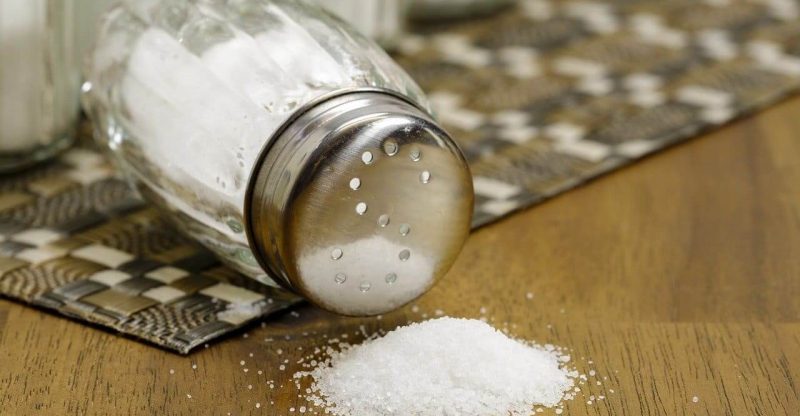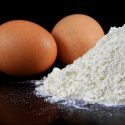What is Calcium Silicate (E552) in Food and Uses In Salts & Supplements?

What is Calcium Silicate | Uses | Safety | Side Effects | FAQs
Calcium silicate, an inorganic ingredient with low bulk density and high water absorption, commonly used as an anticaking agent and carrier in food, the two main applications are in table salts and supplements. E552 is its European food additive number.
What is Calcium Silicate?
A white free-flowing powder, made up of varying proportions of CaO and SiO2, including dicalcium silicate (Ca2SiO4) and tricalcium silicate (3CaO·SiO2), can be divided into anhydrous and hydrous (usually) types. But actually, it is a hypothetical oxide instead of a mixture of silicon dioxide and calcium oxide.
How is it Made?
Generally, it can be produced by diluted calcium chloride or calcium hydroxide with sodium silicate (e.g. waterglass composed of Na2O:SiO2).
Properties
| Appearance | White to off-white free-flowing powder. |
| Other names |
|
| CAS number | 1344-95-2 |
| Chemical formula | xCaO · ySiO2 · zH2O. The food grade meets the requirement of the following composition:
|
| Solubility | Insoluble in water and ethanol. |
What are the Uses in Food?
Food grade calcium silicate is a common anticaking agent used in table salts, food supplements and baking powder. It is also largely used in industrial, e.g. as an alternative to asbestos for insulation in building materials, such as in glass and cement, bricks and fire protection ceilings and boards; a fertilizer as a source of silicon.
Here briefly introduce the applications in table salts and food supplements.
Table Salts
The crystals of table salt are easy to dissolve and the salt will reform crystals after absorbing moisture. Salts solidify together from a loose, free-flowing state to caking, lumping, or aggregation. In order to prevent these caking results, an anti-caking agent is usually added to maintain its looseness and fluidity.
The common anti-caking agents used in table salts are silicon dioxide, calcium silicate, ammonium citrate, potassium ferrocyanide, iron tartrate, sodium ferrocyanide, potassium chloride, etc.
Calcium silicate is a salt additive that can improve the agglomeration and fluidity of table salts. It has a loose and porous structure with a high physical ability of oil absorption and water absorption. It can be well attached on the surface of table salt, preventing it from absorbing water from outside by creating a barrier, and thus resisting the caking effect.
Meanwhile, calcium silicate can reduce the Van Der Waals forces between molecules, which can reduce the attraction between the salt molecules and enhance its flowability.
Supplements
It is not only function as an anticaking agent or carrier in supplement, it can also be used as a supplement of calcium and silicon (1). According to EFSA, food supplements account for 91% of the reported use of silicates.
Is Calcium Silicate Safe to Eat?
Yes, its safety when used as a food additive has been approved by the U.S. Food and Drug Administration (FDA), European Food Safety Authority (EFSA), Joint FAO/WHO Expert Committee on Food Additives (JECFA), as well as other authorities.
FDA
It is generally recognized as safe (GRAS) when used at levels not exceed 2% in table salt and 5% in baking powder. (2)
EFSA
Calcium silicate (E552) is listed in Commission Regulation (EU) No 231/2012 as an authorised food additive and categorized as “additives other than colours and sweeteners” (3)
Safety Re-evaluation in 2018
It was reported by EFSA in 2018, that the absorption of calcium silicate was very low and there was no indication for genotoxicity or developmental toxicity but it was demonstrated that silicon from calcium silicate was accumulated in kidney and liver in rats. Its safety cannot be assessed as a food additive due to the lack of reliable data on subchronic and chronic toxicity, carcinogenicity, and reproductive toxicity. (4)
Authorised Uses
The following products may contain with it (5):
- Dried powdered foods
- Tablet and coated tablet form foods
- Sliced or grated cheese hard and semi-hard cheese
- Processed cheese
- Cheese products
- Table-top sweeteners in powder/tablets form
- Salt and salt substitutes
- Seasonings and condiments
- Dry cereals
- Food supplements supplied in a solid form/liquid form
- Chewing gum
- Emulsifiers and colours
- Dry powdered emulsifiers/polyols/nutrients
UK Food Standards Agency
Categorized in “Others” (6)
Food Standards Australia New Zealand
It is an approved ingredient in Australia and New Zealand with the code number 552. (7)
JECFA
Function class: food additive, anticaking agent. (8)
Acceptable daily intake: ADI “not specific” set in 1985 for it and silicon dioxide, also for certain silicates including aluminium silicate, calcium aluminium silicate and sodium aluminosilicate. (9)
What are the possible Side Effects?
It is common that sometimes consumers have questions whether calcium silicate is bad for our health and what are the possible health risks. It is generally considered safe but some people may be allergic or sensitive to it.
Is it Safe for Pregnant?
Yes, it is generally safe but better consult with your doctor in the condition of use.
Frequently asked questions
Is it Natural?
No, it is made from chemical synthesis as the manufacturing process mentioned above.
Is it Dairy Free?
Yes, it does not contain dairy as the calcium in it is from the lime.
Is it Vegan?
Yes, it is vegan as the following raw materials are from minerals instead of animal sources:
Calcium chloride: manufactured by the treatment of limestone with hydrochloric acid.
Calcium hydroxide: derived from limestone with water.
Sodium silicates: produced by the reaction of silica (from diatomaceous earth) with caustic soda and water.
So it is vegan and suitable for the diet of vegetarians.
Is it Halal?
Yes, it is generally recognised as halal as it is permitted under the Islamic Law and fulfill the conditions of Halal. And we can find some manufacturers certificated with MUI halal.
Is it Kosher?
Yes, it is kosher pareve. E552 has met all the “kashruth” requirements and can be certified as kosher.
Is it Gluten Free?
Yes, it is typically gluten-free and people with celiacs can eat it. It is an ingredient commonly found in both gluten-free and gluten-containing food labels. The production complies with the FDA’s definition of gluten free, that it does not contain wheat, rye, barley, or crossbreeds of these grains.
Conclusion
Now I think you may have a knowledge of Calcium Silicate (E552), from its production; uses in table salts and supplements; approved safety; possible side effects and some FAQs such as is it vegan, gluten free, natural or synthetic and etc.
What kinds of food packaging have you found this ingredient in? Let me know in the comments.



I found it in a powdered supplement. Greens by Sculptnation
Hi Marcia,
Thanks for sharing.
Can I use this for idli batter before packings.
If yes
How much I need to use per kg
Hello,
This ingredient is in a product called “FiberGreens” by BartonNutrition. I didn’t know exactly what it was so I’m glad I did my research. Thanks for the info.
Calcium Silicate is in Dr.Berg’s mineral supplement.
I am trying to find a good multi mineral supplement that does not have any bad stuff in it and it has been a difficult task. Maltodextrin or ascorbyl palmitate is in many supplements. yuck. Dr.Bergs product claims 70+ ingredients but he only lists a few of them on the label. This seems shady to me so….My search continues.